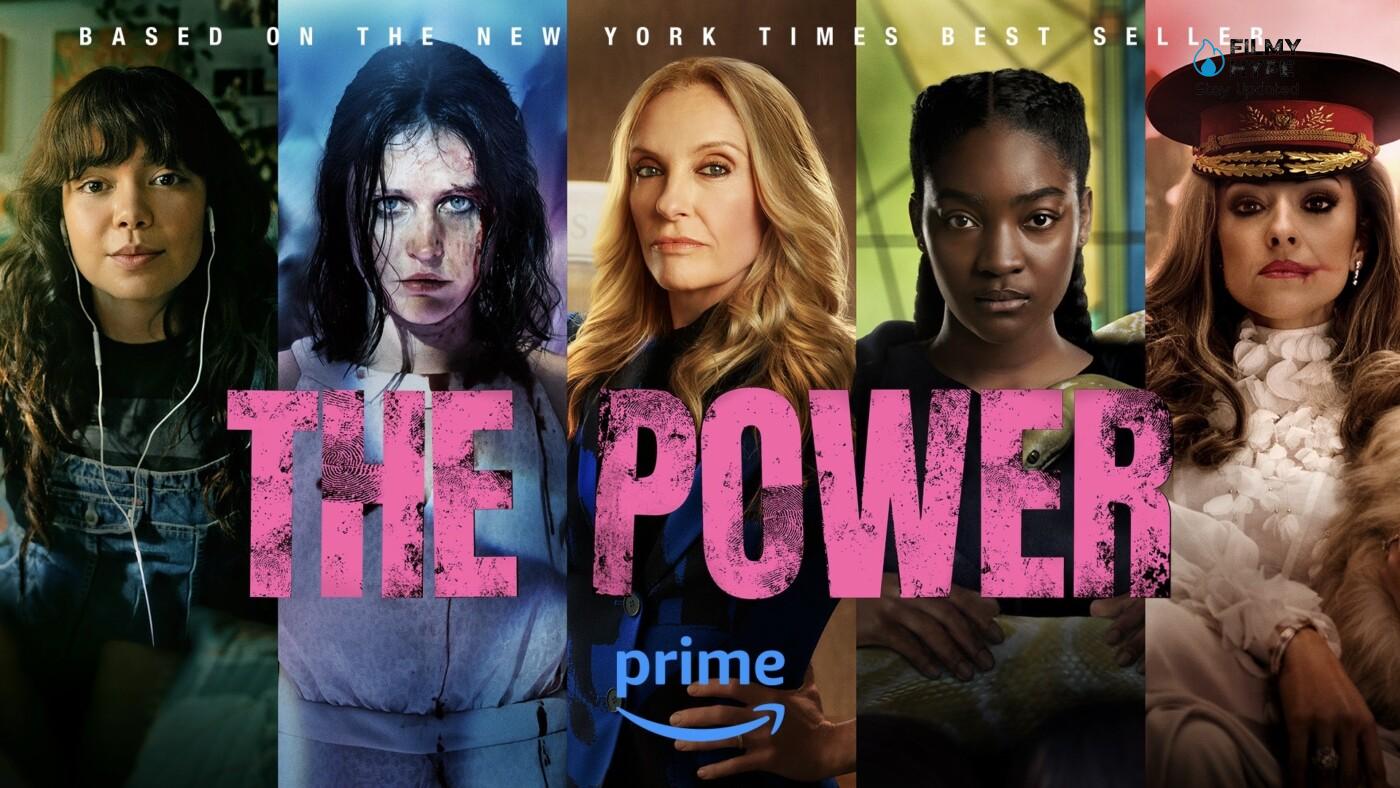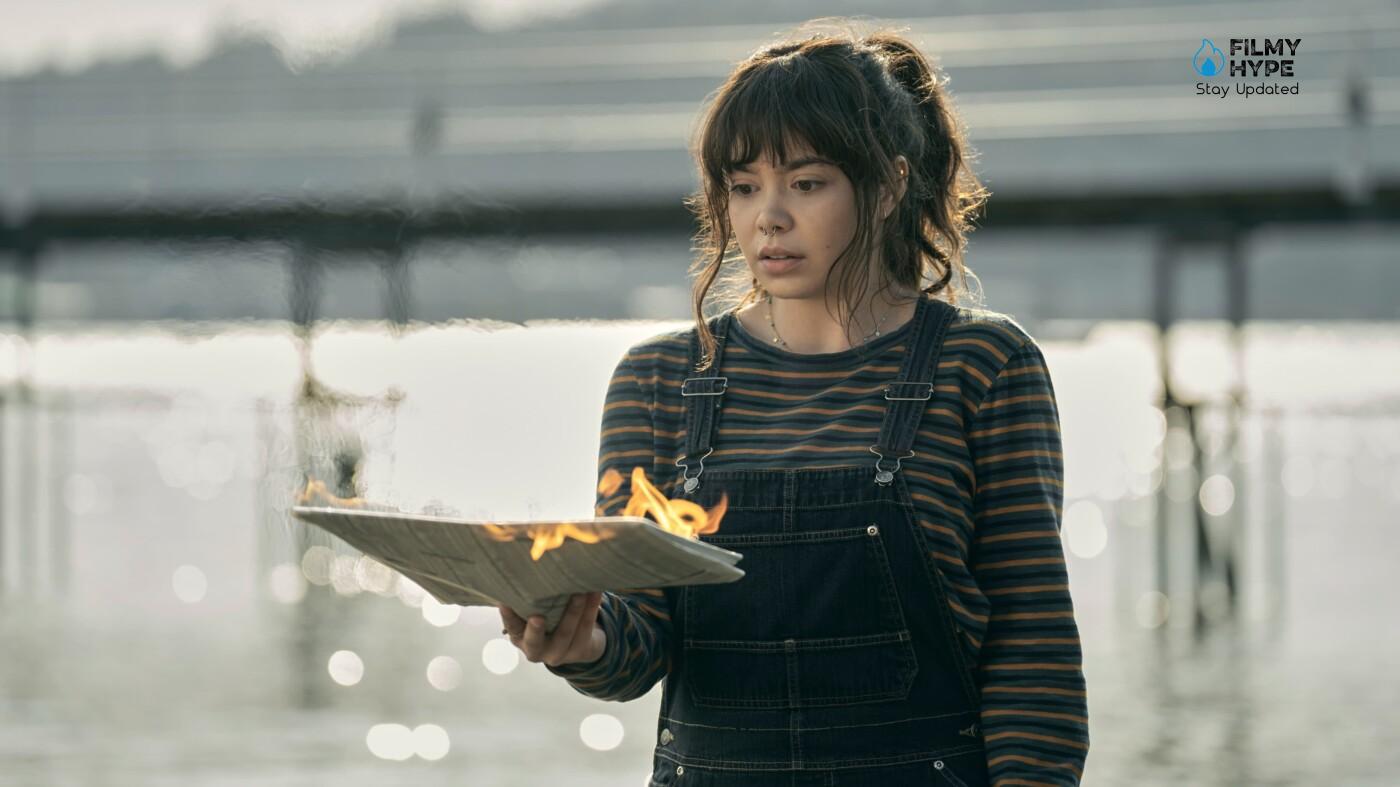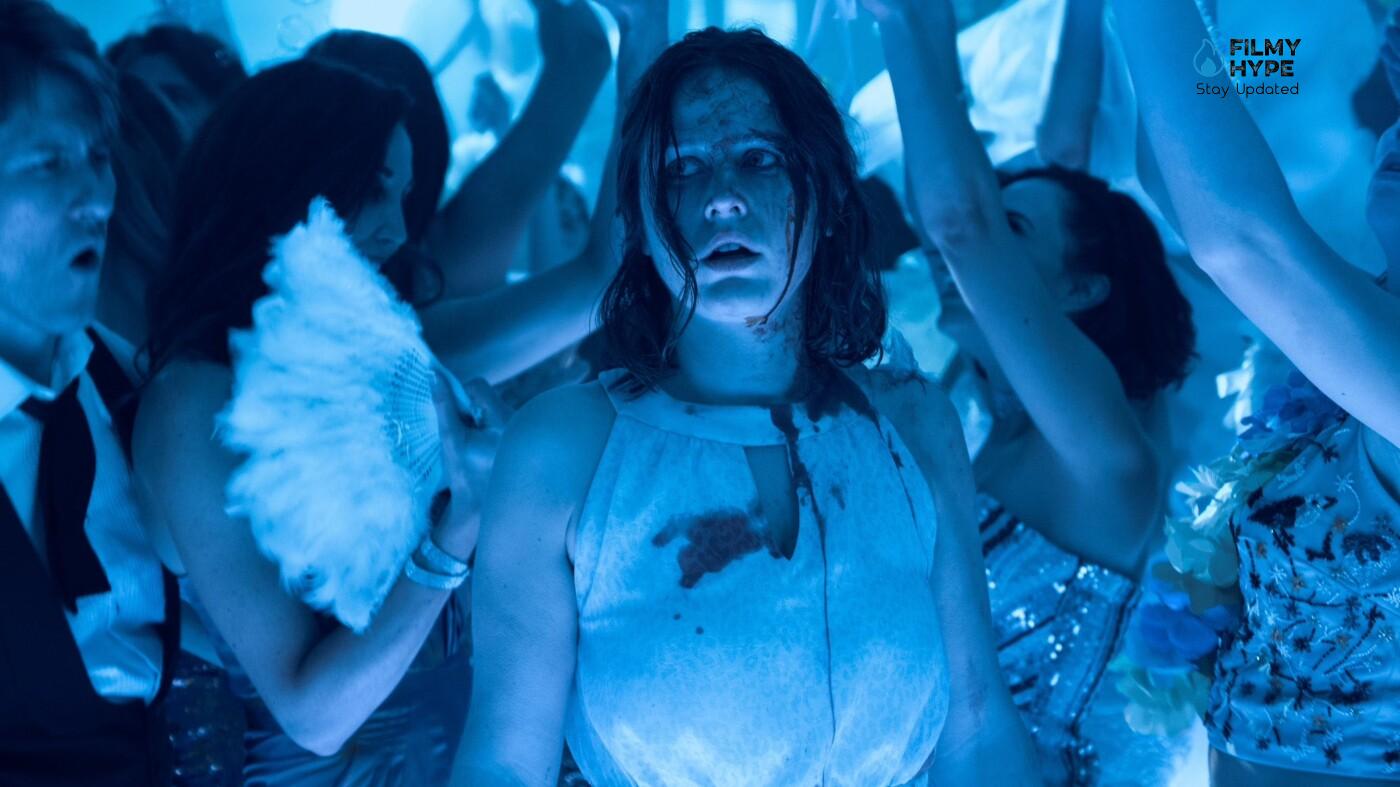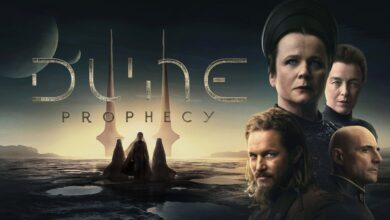The Power Review: Prime Video Series with Action and Reflection Drama and Rhythm a Perfect Alchemy
Cast: Toni Collette, John Leguizamo, Halle Bush, Ria Zmitrowicz, Auli’i Cravalho, Zka Cvka Cvana, Toheeb Jimoh
Creators: Raelle Tucker, Sarah Quintrell, Naomi Alderman
Streaming Platform: Amazon Prime Video
Filmyhype.com Ratings: 4/5 (four stars)
The revolution is coming to Prime Video from March 31st and the protagonists will be The Power from the pen of the British writer Naomi Alderman. This new series is based on the dystopian sci-fi novel of the same name, a real editorial case, winner of the Baileys Women’s Prize 2017. The author of the book sets a choral story that allows us to show the main characters in the various states around the continents that guide us through new social and political scenarios. This is also the choice made by showrunner Raelle Tucker who worked with an all-female writer’s room that includes Claire Wilson, Sarah Quintrell, Whit Anderson, Stacy Osei-Kuffour, Rebecca Levene, Raelle Tucker, Sue Chung, Brennan Peters, Michelle Hsu. Behind the camera, of the nine episodes produced by Amazon Studios and SISTER already the production house of the award-winning Chernobyl miniseries, there are only female directors including Ugla Hauksdóttir, Lisa Gunning, Neasa Hardiman, Logan Kibens, and Shannon Murphy.

As we will see in this review of The Power (The Power), the series created by Raelle Tucker, Sarah Quintrell, and Alderman herself, does not deviate from the path traced by the novel and takes its time to introduce the different subplots and numerous characters. The first three episodes that we have seen in the preview, and which will arrive on Prime Video on March 31st and then continue weekly, in fact, act as a perfect introduction to what is to come, precisely outlining both the stories of the protagonists, all so different from each other on the other, as the initial impact that an evolutionary leap (because that’s what it is about, nothing supernatural in short) of this type could have on today’s societies. What makes The Power so interesting is its being so “international”: we move from one country to another, from one socio-cultural reality to another. If in certain places the change is digested slowly, in an almost more “silent” but no less radical way, violent revolutions will break out in other countries.
The Power Review: The Story Plot
The Power follows, as we anticipated, many different stories. There’s Margot Cleary-Lopez (Toni Collette), a mayor who aspires to a glittering political career, supported by her perfect husband Rob (John Leguizamo) but who can’t fix her relationship with her eldest daughter, Jos (Auli’i Cravalho), from which she has long distanced herself. We then meet Allie (Halle Bush), a girl in foster care of what seems like her perfect family, too bad that her father systematically rapes her. From the United States, we move before her to England, where Roxy (Ria Zmitrowicz) is trying to gain respect from her father, a London organized crime boss; then to the fictional state of Carpathia, where there is Tatiana Moskalev (Zka Cvka Cvana), a former gymnast now married to the local dictator; finally in Nigeria.
Like these girls, who meet in secret to share their experience, even those we have previously met begin to produce electricity from their hands, first small sparks then stronger and stronger shocks. These are above all the younger ones, whom one after the other find themselves with this unexpected ability and slowly learn to control it. It even seems that their power is “contagious”, that it can be activated with physical contact: it is an evolutionary leap forward, women, have developed a new organ capable of creating electricity, an organ that begins to function both in spontaneously than with the “help” of someone else.
The Power plunges into an alternate present, allowing us to imagine our world from its current path as The Handmaid’s Tale does. The first and second episodes take the time to patiently introduce the six main characters, making them clear and letting us know them in all their facets. In North America Allie (Halle Bush) is introduced, an African American girl adopted by a local family and victim of sexual abuse by her adoptive father, always accompanied by an inner voice in her head, which helps her to survive. In England in London lives Roxy (Ria Zmitrowicz) the daughter of Bernie Monke (Eddie Marsen) a wealthy London mobster.

Meanwhile, in Seattle we find the teenager Jos (Auli’i Cravalho) grappling with her first crush at school for a classmate and quarrels with her parents. Unfortunately, her mother is not just any woman, but the mayor of the city Margot Cleary-Lopez (Toni Collette) and her father Rob (John Leguizamo) is a doctor. The only male voice is that of Tunde (Toheeb Jimoh) a reporter from Nigeria who publishes incredible videos on the internet starring young African women who immediately become viral. Closing the circle of six storylines around the world is Tatiana Moskalev (Zrinka Cvitesic) a former artistic gymnastics prodigy as explained in some flashbacks of his past, and now the “trophy wife” of an Eastern European dictator who lives in the luxury of a sumptuous palace that is his prison, meanwhile his people are hungry and very poor.
In the third episode of The Power, the plot finally moves, and we begin to know the phenomenon that has affected the girls. Orphaned Allie, now calling herself Eve, meets similar girls and is welcomed into a convent run by nuns. Meanwhile, already alarmed by the strange phenomena, the FBI investigates, and the media do the same, which are curious, and the blogger Tunde is contacted directly by CNN to tell the story of the “new witches”. The novelty is that this strange virus strikes during the developmental period as a mysterious genetic mutation, but it only happens in the bodies of young women. The final scene is the one that gives hope to the revolution with the cry of The Power where all female human beings are aware that a radical change is coming. But the question that arises at the end of these three episodes will be better or worse the looming future?
The Power Review and Analysis
The strength of The Power, as much for the TV series as it was for the novel, lies precisely in its being so wide-ranging. It is a choral tale that moves from one point of the planet to another, taking its time to analyze what would happen in different types of societies: we have the “civilized” West, in which female oppression is still evident in the rooted dynamics of power between men and women, then we move on to those places on the planet where violence against the “weaker sex” is the order of the day, and where the reversal of roles will be accompanied by furious revolutions. What impact can such a change have? The Power accompanies us to discover a world in which what has always been the shared perception of the differences between men and women suddenly disappears. The first three episodes are essential for laying the foundations for what is to come, they allow us to get to know the characters and the different stories that see them as protagonists, seeing how much different starting situations will evolve after the discovery of a common power.
The cast choices of the series seemed to us, at least from the first three episodes, really perfect to bring this story to life on the small screen. In particular, we were struck by the interpretations of Toni Collette in the role of a woman torn between career and family, forced to submit to the preferences of the electorate (never too confident, because it could intimidate, nor too submissive; never dressed too well because it could seem snobbish, but not neglected either, because in this way she would be considered unreliable…) and not to follow her teenage daughter Jos, with whom her relationship is inevitably deteriorating. Then there is Ria Zmitrowicz, the illegitimate daughter of a boss, the only female, who would only like to make a father proud and whose only language is violence.
The male counterparts do not disappoint either, in particular Toheeb Jimoh (whom we loved in Ted Lasso) and John Leguizamo, even if as it is logical to imagine in a story of this type, they are a bit marginal compared to the protagonists. Over time it is clear that they too will play a more defined and important role in the series because, in a world where there is such a radical reversal of roles, a male point of view is also needed. The Power promise to be a really interesting journey and we can’t wait to see how the story will evolve in the next episodes: for now, it was a fascinating vision capable of laying excellent foundations, however, it all depends on how the authors will carry on a plot that becomes increasingly complex and articulated.

The phrase that immediately comes to mind like the “Nolite te bastardes carborundorum” in The Handmaid’s Tale is the one said by mayor Margot who says ” Every revolution begins with a spark” Of the words that are still so topical, just think of the images that pass every day on the news such as the revolts of young people and women in Iran against a power influenced by a patriarchal religion or simply those Western feminist demonstrations in which the focus is on gender equality, the gender question and the secure right to abortion. Even the theme that we have all experienced in the last three years, such as the sudden and wild spread of Covid, makes it even easier to imagine something, be it a virus or an organ that has evolved, that comes out of nowhere. Certain scenes in the series seem to have been filmed in hospitals when the Pandemic was at its maximum contamination.
Although the task of the screenwriters was far from easy, and the plurality of characters and settings certainly did not facilitate their mission, The Power finds a perfect narrative balance and manages to immediately capture the viewer’s attention, emerging strongly in the contemporary serial landscape. The alternation of the various points of view is expertly managed, and gives rhythm and dynamism to the story, pressing us with continuous evolutions, twists, and changes of tone, without ever stagnating unnecessarily. At the same time, The Power is also a series that knows how to denounce and make people think, and masterfully uses the language of science fiction to shine a spotlight on profound and highly topical issues.
Just like the novel on which it is based, the show proves that it knows how to stop and give the right gravitas to events whenever necessary, bringing out uncomfortable questions and disturbing perspectives. Ultimately, The Power starts in the best way and proves capable of shedding skin without ever settling down, escaping the trap of declining the feminist message in an austere and moralizing drama. Now the challenge will consist in confirming the height of the excellent three debut installments: the history of the novel is full of changes and evolutions that will increasingly tend to increase the dystopian veins, and the authors will certainly not be able to rest on their laurels. In the meantime, we can only enjoy a promising start with enormous potential, in the hope that the series will always be able to keep its ambitions high.
The decisive test to decree the success or failure of a TV show like The Power, however, also and above all invests the performance of its main interpreters: by basing its entire narrative system on the interweaving of five parallel storylines, the risk of generating unpleasant qualitative asymmetries was really around the corner, and at least on paper the cast didn’t include big Hollywood stars particularly known to the general public. Against all odds, however, the Prime Video series succeeds in the enterprise and indeed exceeds our wildest expectations by offering us a lively symphony of talents, worthy of the excellent Sense8 of the Wachowsky sisters: from Toni Colette, charismatic interpreter of the mayor of Seattle and spearhead of the cast of the series, to the five protagonists who have the task of accompanying us throughout the various episodes, each story is made relevant and plausible by a team of truly convincing actresses and actors, always at ease in their role and capable of give a strong identity to their characters, without ever flattening themselves to a mere copy of the paper counterpart, nor, on the contrary, betraying their DNA.
Allie, Roxy, Jos, Tunde, and Tatiana are solid and three-dimensional characters, who adequately support their storylines and never leave us indifferent, resulting in immediately identifiable and well-characterized. There are the depth and vibrant denunciation of The Handmaid’s Tale, the out-of-control power of The Boys, the international chorus of Sense8, and the proliferation of a viral mutation that almost seems to wink at The Last of Us and Sweet Tooth: The Power, with its effective serial reworking of Naomi Alderman’s novel, touches a large number of different keys and creates a decidedly new product, which is not aimed only at the circle of the feminist world, but seeks to influence and raise awareness a much wider audience.
It is a lively, changeable, and difficult-to-define series, which dances with agility and awareness on the borderline of several genres, escaping any attempt at unitary classification. The signs of the strong experimentation of the authors are already evident in the first three episodes, which try to convey an important and current message with a completely new and compelling register: the phrase by Toni Colette that opens the series is particularly iconic, “Every revolution begins with a spark,” which can introduce both an arthouse drama and a Black Lightning-esque superpower story. Difficult to propose a term of comparison in the already existing serial panorama: to discover the true face of The Power, one must necessarily start exploring the series…
The Power Review: The Last Words
The Power wants to insinuate among the most talked about serial releases of the year that have already shown a world similar to ours, but which has been upset and changed by a virus, for example in The Last of Us. However, this series focuses on the wave of new feminism where power and the future are only in women’s hands. An ambitious series with a great cast among which Toni Collette stands out in the role of the mayor of Seattle. The Power is the transposition of Naomi Alderman’s bestseller, a particularly intriguing story that imagines a world where women become the stronger sex. A perfect ensemble cast, led by Toni Collette, brings Alderman’s story to life. Although it was far from a simple task, The Power manages to offer us a solid and convincing adaptation of Naomi Aldeman’s best seller, making us reflect on the darkest aspects of our society and the very concept of power.







